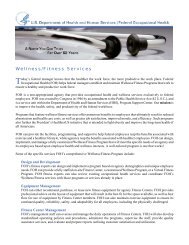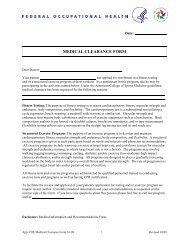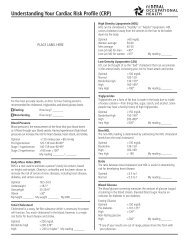Helping Others Cope With Grief - U.S. Department of Health and ...
Helping Others Cope With Grief - U.S. Department of Health and ...
Helping Others Cope With Grief - U.S. Department of Health and ...
Create successful ePaper yourself
Turn your PDF publications into a flip-book with our unique Google optimized e-Paper software.
A LifeCare® Guide to <strong>Helping</strong> <strong>Others</strong> <strong>Cope</strong> <strong>With</strong> <strong>Grief</strong><strong>Helping</strong> a Co-WorkerWhen grief enters the workplace, complications may arise because the dem<strong>and</strong>s <strong>of</strong>most businesses make it difficult to allow time for comforting <strong>and</strong> grief. Paidbereavement leave is <strong>of</strong>ten limited (your co-worker should check with your HumanResources department regarding your company’s policy), <strong>and</strong> employees may returnto work before they are emotionally ready.Many <strong>of</strong> the previous suggestions may still apply to a co-worker who has experienceda loss, but since you may not be as involved in your co-worker’s life away fromwork, it’s important to consider the following information: If your co-worker notified you <strong>of</strong> his or her loss, inquire about what details heor she would like you to give out to other co-workers. Find out if your coworkerwould appreciate receiving flowers or a fruit basket; you might evenmake a donation to a charitable organization or support group in the name <strong>of</strong>your co-worker’s loved one. Pass around a card for others in the workplace tosign. When your co-worker returns to work, realize how dramatically his or her lifemay have changed. The effects on your co-worker’s pr<strong>of</strong>essional behavior maybe significant <strong>and</strong> varied. A grieving co-worker may act eager to be away fromthe grief, to bury him or herself in work <strong>and</strong> the daily routine. This should not,however, signal that your co-worker is completely healed. Try to underst<strong>and</strong> that the co-worker may not be able to focus completely onwork for a long time. <strong>With</strong> your manager’s help, evaluate how much your coworkercan h<strong>and</strong>le, <strong>and</strong> <strong>of</strong>fer to share the workload <strong>and</strong> pull together as a teamto help your co-worker get back on track.Tips for <strong>Helping</strong> a Co-WorkerIf a co-worker is grieving the loss <strong>of</strong> a loved one, you will probably want toapproach him or her to express your condolences. If you are good friends,you may want to say something more meaningful about your co-worker’s lossor just to <strong>of</strong>fer support. However, there may be times when everything youthink to say sounds wrong in your head—<strong>and</strong> it will probably be worse if thewords actually leave your mouth. At these moments, it is simply best to saynothing.Even though you may feel awkward or embarrassed at times, remember thatfriends <strong>and</strong> co-workers can be a significant source <strong>of</strong> support to those whohave recently experienced a loss. The following steps will help to show yourco-worker that you care <strong>and</strong> want to be supportive. You may want to: Become involved in the re-entry process, which occurs when a personreturns to work after a loss. Help your colleague manage the transitionback to work by keeping connected with him or her. A friendly voice—inperson or over the telephone—is always welcome. Ask your company’sHuman Resources department how you can help.Page 6















